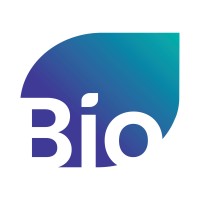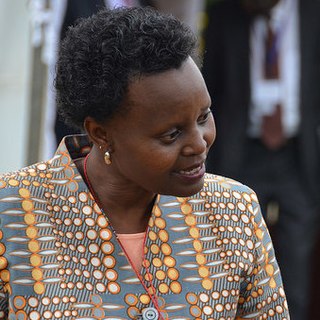
Biotechnology is a multidisciplinary field that involves the integration of natural sciences and engineering sciences in order to achieve the application of organisms and parts thereof for products and services.
The Monsanto Company was an American agrochemical and agricultural biotechnology corporation founded in 1901 and headquartered in Creve Coeur, Missouri. Monsanto's best-known product is Roundup, a glyphosate-based herbicide, developed in the 1970s. Later, the company became a major producer of genetically engineered crops. In 2018, the company ranked 199th on the Fortune 500 of the largest United States corporations by revenue.

Genetically modified crops are plants used in agriculture, the DNA of which has been modified using genetic engineering methods. Plant genomes can be engineered by physical methods or by use of Agrobacterium for the delivery of sequences hosted in T-DNA binary vectors. In most cases, the aim is to introduce a new trait to the plant which does not occur naturally in the species. Examples in food crops include resistance to certain pests, diseases, environmental conditions, reduction of spoilage, resistance to chemical treatments, or improving the nutrient profile of the crop. Examples in non-food crops include production of pharmaceutical agents, biofuels, and other industrially useful goods, as well as for bioremediation.

Genetically modified food controversies are disputes over the use of foods and other goods derived from genetically modified crops instead of conventional crops, and other uses of genetic engineering in food production. The disputes involve consumers, farmers, biotechnology companies, governmental regulators, non-governmental organizations, and scientists. The key areas of controversy related to genetically modified food are whether such food should be labeled, the role of government regulators, the objectivity of scientific research and publication, the effect of genetically modified crops on health and the environment, the effect on pesticide resistance, the impact of such crops for farmers, and the role of the crops in feeding the world population. In addition, products derived from GMO organisms play a role in the production of ethanol fuels and pharmaceuticals.
Erik Tambuyzer is a Belgian bio-engineer and businessman. He is Chairman of the Board of the Flemish Center for Medical Innovation (CMI).
China has seen double-digit growth in its biotechnology industry and has gone from being one of the slowest to one of the fastest nations in the adoption of new biotechnologies. The biotech sector is seen in China and internationally as a core area of national scientific and economic development. The main national biotech body in the country is the China National Center for Biotechnology Development. The CNCBD is an organization established on November 3, 1983, under the Ministry of Science and Technology with the approval of the State Council. CNCBD is the sole national center to coordinate and implement the national S&T program in Biotechnology and Health.

The Non-GMO Project is a 501(c)(3) non-profit organization focusing on genetically modified organisms. The organization began as an initiative of independent natural foods retailers in the U.S. and Canada, with the stated aim to label products produced in compliance with their Non-GMO Project Standard, which aims to prevent genetically modified foodstuffs from being present in retail food products. The organization is headquartered in Bellingham, Washington. The Non-GMO label began use in 2012 with Numi Organic Tea products.

A genetically modified soybean is a soybean that has had DNA introduced into it using genetic engineering techniques. In 1996, the first genetically modified soybean was introduced to the U.S. by Monsanto. In 2014, 90.7 million hectares of GM soybeans were planted worldwide, making up 82% of the total soybeans cultivation area.

André Choulika is a biotechnologist, the inventor of nuclease-based genome editing and a pioneer in the analysis and use of meganucleases to modify complex genomes.

The regulation of genetic engineering varies widely by country. Countries such as the United States, Canada, Lebanon and Egypt use substantial equivalence as the starting point when assessing safety, while many countries such as those in the European Union, Brazil and China authorize GMO cultivation on a case-by-case basis. Many countries allow the import of GM food with authorization, but either do not allow its cultivation or have provisions for cultivation, but no GM products are yet produced. Most countries that do not allow for GMO cultivation do permit research. Most (85%) of the world's GMO crops are grown in the Americas. One of the key issues concerning regulators is whether GM products should be labeled. Labeling of GMO products in the marketplace is required in 64 countries. Labeling can be mandatory up to a threshold GM content level or voluntary. A study investigating voluntary labeling in South Africa found that 31% of products labeled as GMO-free had a GM content above 1.0%. In Canada and the US labeling of GM food is voluntary, while in Europe all food or feed which contains greater than 0.9% of approved GMOs must be labelled.
Genetic engineering in the European Union has varying degrees of regulation.

A genetically modified tree is a tree whose DNA has been modified using genetic engineering techniques. In most cases the aim is to introduce a novel trait to the plant which does not occur naturally within the species. Examples include resistance to certain pests, diseases, environmental conditions, and herbicide tolerance, or the alteration of lignin levels in order to reduce pulping costs.
GMO Answers is a front group launched by the agricultural biotechnology industry in July 2013 to participate in public debate around genetically modified organisms (GMOs) in crops in the U.S. food supply.

Henri A. Termeer was a Dutch biotechnology executive and entrepreneur who is considered a pioneer in corporate strategy in the biotechnology industry for his tenure as CEO at Genzyme. Termeer created a business model adopted by many others in the biotech industry by garnering steep prices— mainly from insurers and government payers— for therapies for rare genetic disorders known as orphan diseases that mainly affect children. Genzyme uses biological processes to manufacture drugs that are not easily copied by generic-drug makers. The drugs are also protected by orphan drug acts in various countries which provides extensive protection from competition and ensures coverage by publicly funded insurers. As CEO of Genzyme from 1981 to 2011, he developed corporate strategies for growth including optimizing institutional embeddedness nurturing vast networks of influential groups and clusters: doctors, private equity, patient-groups, insurance, healthcare umbrella organizations, state and local government, and alumni. Termeer was "connected to 311 board members in 17 different organizations across 20 different industries" He has the legacy of being the "longest-serving CEO in the biotechnology industry.

The Biotechnology Innovation Organization (BIO) is the largest advocacy association in the world representing the biotechnology industry. It was founded in 1993 as the Biotechnology Industry Organization from a merger of the Industrial Biotechnology Association (IBA) and the Association of Biotechnology Companies (ABC), and changed its name to the Biotechnology Innovation Organization on January 4, 2016. Biotechnology Innovation Organization serves more than 1,100 biotechnology firms, research schools, state biotechnology centers and related associations in the United States and in more than 30 other countries.
India and China are the two largest producers of genetically modified products in Asia. India currently only grows GM cotton, while China produces GM varieties of cotton, poplar, petunia, tomato, papaya and sweet pepper. Cost of enforcement of regulations in India are generally higher, possibly due to the greater influence farmers and small seed firms have on policy makers, while the enforcement of regulations was more effective in China. Other Asian countries that grew GM crops in 2011 were Pakistan, the Philippines and Myanmar. GM crops were approved for commercialisation in Bangladesh in 2013 and in Vietnam and Indonesia in 2014.
Genetic engineering in North America is any genetic engineering activities in North America
Biotechnology in the United Kingdom is the British industry regarding organisms that manufacture commercial products, whether the genes of the organism have been naturally procured or not. The industry can be controversial, and often overlaps with the healthcare and pharmaceutical industry (biopharmaceuticals). Currently, most industrial biotechnology expenditure in the UK is in the field of healthcare, and consequently the UK is the leader in Europe in the development of biopharmaceuticals, by some distance.

Margaret Gathoni Karembu is a Kenyan science educator and science management specialist in the fields of technology transfer and the applications of biotechnology in Africa. She is the Director of the AfriCenter division of the ISAAA, a non-profit international organization that shares agricultural biotechnology, focusing on genetic engineering. She is the chair of the Open Forum on Agricultural Biotechnology Programming Committee, Kenya Chapter.
Mohammad Hussain Ahmad, usually cited as M. H. Ahmad, is an Indian academic and professor emeritus of biotechnology at the University of the West Indies who served as the founding director of the institute's Biotechnology Centre between 1990 and 2011. His research focused on medicinal plants, molecular biology as well as genetic engineering and was conferred with the Order of Distinction in 2024 for his role in enhancing agricultural production in the Caribbean. He is also a former science advisor to Jamaican prime minister P. J. Patterson and a former board member of the National Commission on Science and Technology.







